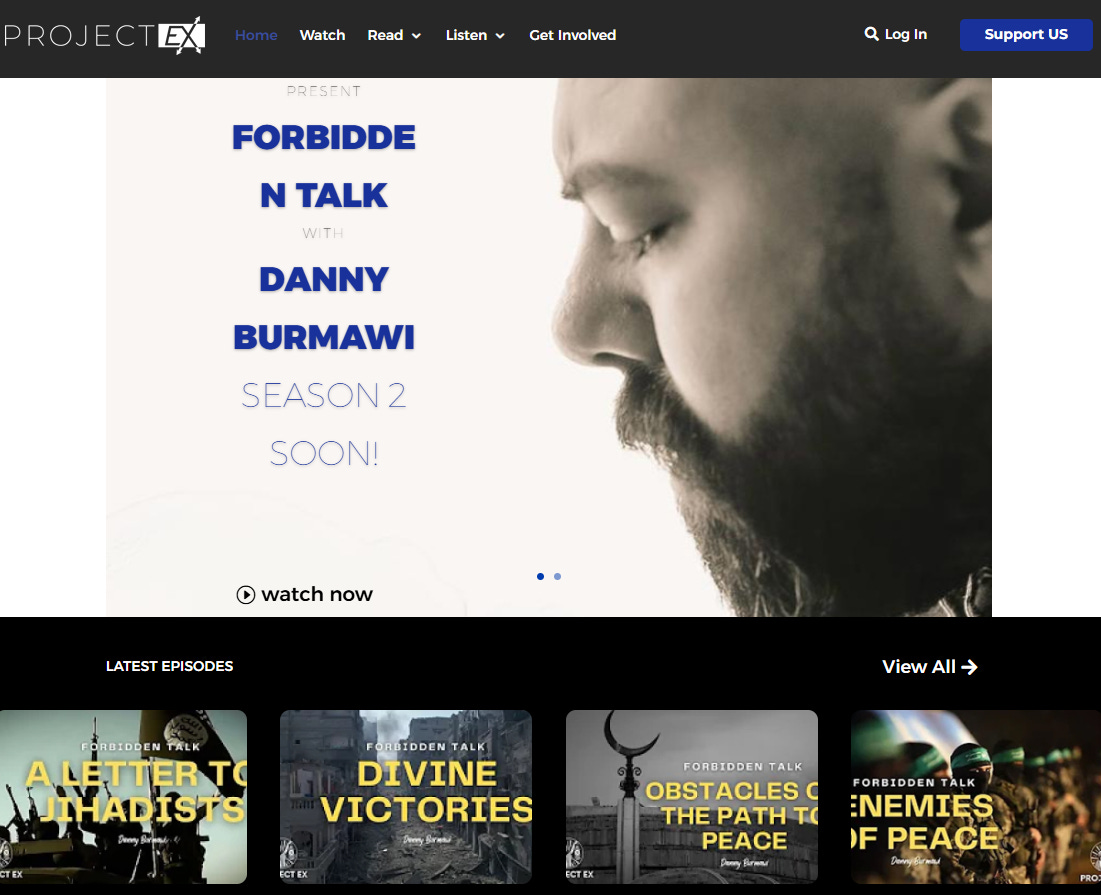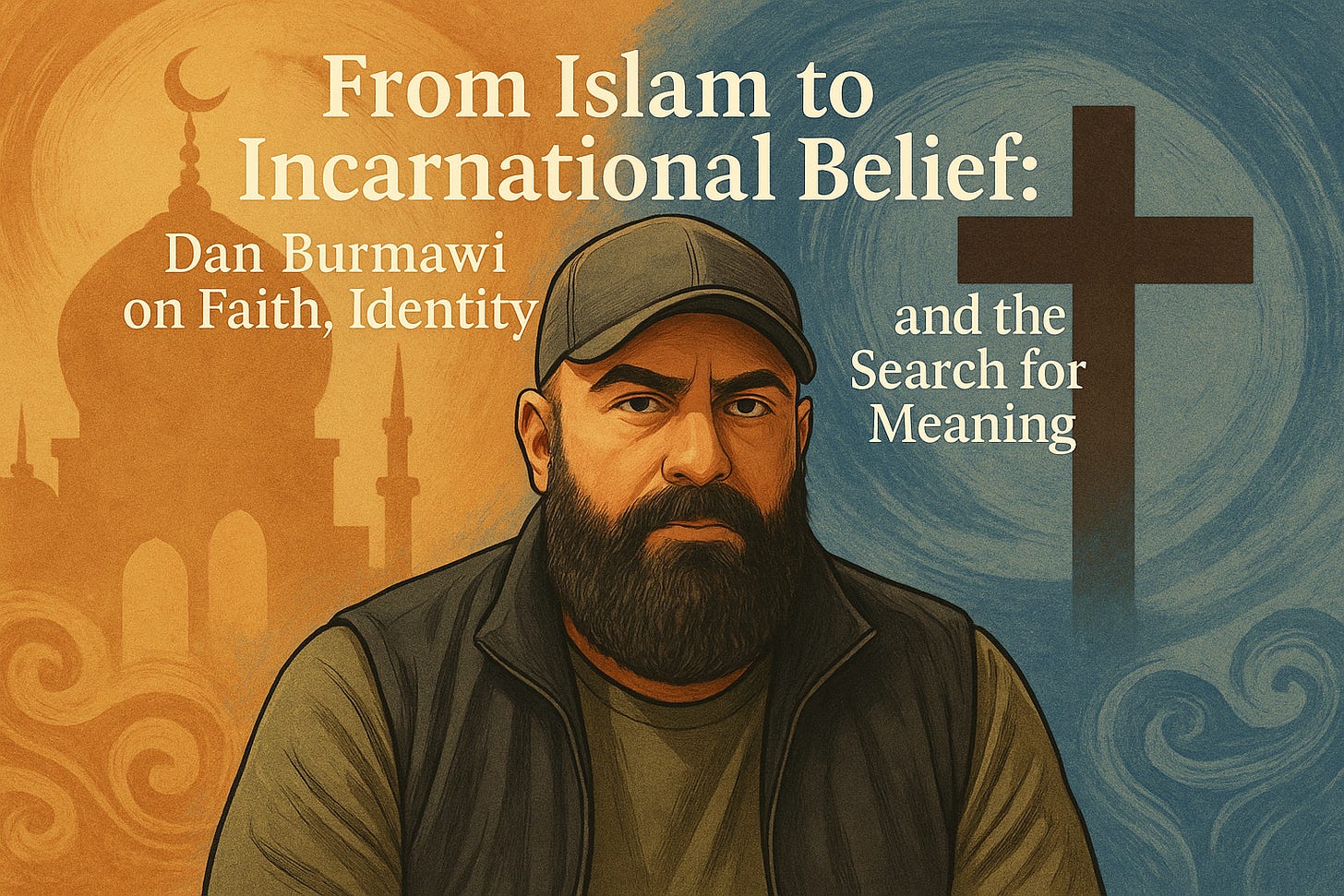From Islam to Incarnational Belief: Dan Burmawi on Faith, Identity, and the Search for Meaning
A Middle Eastern-born theologian and founder of Project Ex speaks candidly about his conversion to Christianity, interfaith engagement, and the ideological threats facing the West and Israel
Dan Burmawi, theologian, author, and CEO of Project Ex, is reshaping the discourse on religious identity and Middle Eastern geopolitics. Through a deeply personal transformation and years of experience in both the region and the West, Burmawi offers a penetrating critique of Islamic orthodoxy, an impassioned defense of Israel and the Jewish people, and a call to moral clarity in an age of ideological confusion. His work, rooted in both lived experience and theological conviction, centers on countering extremism, challenging epistemological falsehoods, and building bridges that don’t compromise truth.
A Conversion Born of Crisis
“It was a convergence of epistemological crisis, emotional dissonance, and spiritual hunger," Burmawi says when asked about his decision to leave Islam for Christianity. He describes the Islamic worldview he grew up in as a "totalizing framework" that controlled thought and feeling. But it eventually collapsed under the weight of its own contradictions. Christianity, by contrast, offered him "incarnational truth" and a foundation of grace that replaced fear with freedom.
Reclaiming Judaism from Islamic Revisionism
Burmawi reflects on how Islam taught him to see Judaism not as a legitimate faith, but as a theological failure. "I was taught that the Jewish people were spiritually obsolete," he says. But breaking free from Islamic supersessionism led him to rediscover Judaism as "a living testimony to divine fidelity across millennia." For Burmawi, this shift has been both theological and ethical, transforming how he understands chosenness and covenant.
The Challenge of True Interfaith Dialogue
Burmawi believes interfaith dialogue can only succeed when all participants come to the table with mutual respect for difference. While he sees hope in Jewish-Christian exchanges, he is skeptical of Islamic engagement. Islam's fusion of religion and state, he argues, creates a "hegemonic impulse" that often sees dialogue as a one-way path to conversion. "You can coexist with supremacism," he says, "but only if you are epistemically grounded and morally immovable."
Project Ex: Deconstructing Narrative Control
At the heart of Burmawi’s mission is Project Ex, which he describes as "a hermeneutical intervention" against Islamic dominance in Middle Eastern historiography. He critiques both Western deference to Islam and the tendency of nations like Israel to secularize the conflict by detaching it from its theological roots - a move he says has come at great cost. "Project Ex is not about provocation," he says, "it’s about epistemic liberation."

Facing Backlash with Steadfast Resolve
Given his background and bold stances, Burmawi is no stranger to threats and social pressure. But he is unshaken. "Truth has an eschatological weight," he says, explaining that even hostility is proof that his words have struck a nerve. "I don’t argue to win debates; I speak to awaken sleepers."
Unlikely Alliances and Shared Hatreds
Burmawi sees the alliance between radical Islamists and the extreme left as more than just political expediency. “This alliance is a dialectical fusion of religious absolutism and secular nihilism,” he explains. While their worldviews appear contradictory—Islam rooted in revelation, and the radical left in relativism—both are united by what they oppose. “Their common ground is their hatred for the Judeo-Christian moral order, for Israel as a symbol of civilizational resilience, and for the West’s insistence on human dignity rooted in imago Dei,” he says.
According to Burmawi, Israel is more than a geopolitical flashpoint—it is a theological offense to both extremes. “Israel attempted to secularize its conflict, separating it from its theological roots, and paid for it in blood,” he notes. This miscalculation, he argues, has allowed adversaries to frame the conflict through distorted ideological narratives rather than historical or covenantal truth. In his view, antisemitism today often masquerades as political critique, but beneath the surface lies a deeper animus toward what Israel represents—a people chosen not for privilege, but for purpose.
Dan’s Message to the Jewish Community
When asked what message he would share directly with Jewish readers, Burmawi’s tone becomes fierce and resolute. “You are not merely surviving history, you are defying it. You are not occupiers, you are the remnant.” He believes the enduring hatred toward Jews has less to do with policy and more to do with metaphysics. “The war you face is not over land, it’s over meaning,” he says. “You are hated not for what you do, but for what you signify: continuity, covenant, and chosenness.”
He cautions against appeasement. “Do not apologize for your existence. Do not negotiate with ideologies that want you erased.” For Burmawi, Israel’s mere existence is a challenge to the prevailing cynicism of the age. “Israel is not simply a state, it is a metaphysical scandal to a world that prefers Jews as ghosts, not citizens. So stand firm. Be unapologetic. Your presence is your vindication.”
Hope in Jewish-Christian Solidarity
Despite a long history of pain, Burmawi finds hope in the reawakening of Christian awareness of their Hebraic roots. He believes that beyond politics lies a shared metaphysical DNA that can foster solidarity in the face of rising antisemitism and nihilism. "We may diverge on the person of Messiah," he says, "but we are united in the fight against the idolatries of nihilism, totalitarianism, and antisemitism."




Islam needs to put down the sword and adopt the original, pure religion of Abraham (hanif). Come to think of it, Christians and Jews might consider doing the same? Meet in the one place where we all can agree: https://shorturl.at/B671V